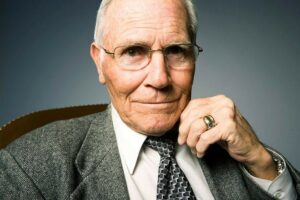A recent blog post noted one of those individuals, the late Ross Perot, who saw value in communicating with the media.
My writing about Perot brings to mind another sharp-minded Texan I had the pleasure of meeting. It was a spontaneous encounter in front of the Jefferson County Courthouse in Beaumont, Texas.
Perhaps you remember the late Richard “Racehorse” Haynes. He was a flamboyant trial lawyer who defended celebrities, big hitters and individuals of enormous wealth. He was, as I understood it, a tremendous courtroom thespian, known for a dramatic flair.
Here’s what happened during one sweltering day in downtown Beaumont …
I was walking toward the courthouse when I ran into a fellow I knew well, a lawyer named Gilbert Adams, who at the time also served as chairman of the Jefferson County Democratic Party. We chatted for a moment. Then Adams asked if I wanted to meet Racehorse Haynes. Do I? Of course I would, I said.
Adams yelled at the gentleman standing about 30 feet away, “Hey Race! I want to introduce you to someone.”
We approached Haynes and Adams said, in effect, “John, this is Racehorse Haynes. Race, this is John Kanelis. John is the editorial page editor of the Beaumont Enterprise.”
Here is where it got real interesting in a hurry. When Adams told Haynes I worked for the newspaper, which in the late 1980s and early 1990s was still a significant media presence in the Golden Triangle, Haynes’ eyes expanded to the size of saucers. He opened them wide and seemed, as I recall, to nearly drop the pipe he was smoking out of his mouth.
He then regaled me about his relations with the media, how he generally trusted the media — if you can believe such a thing in today’s climate — to report matters accurately and fairly.
Haynes talked, talked and talked some more. He talked so much that I — not this famous lawyer — was forced to cut the conversation off. I had somewhere I needed to be; I guess Racehorse Haynes had a lot of time on his hands.
I remember meetings like that one with fondness, if only because it reminds of a time when journalism — and those of us who practiced the craft of journalism — played critical roles in telling their communities’ stories.

